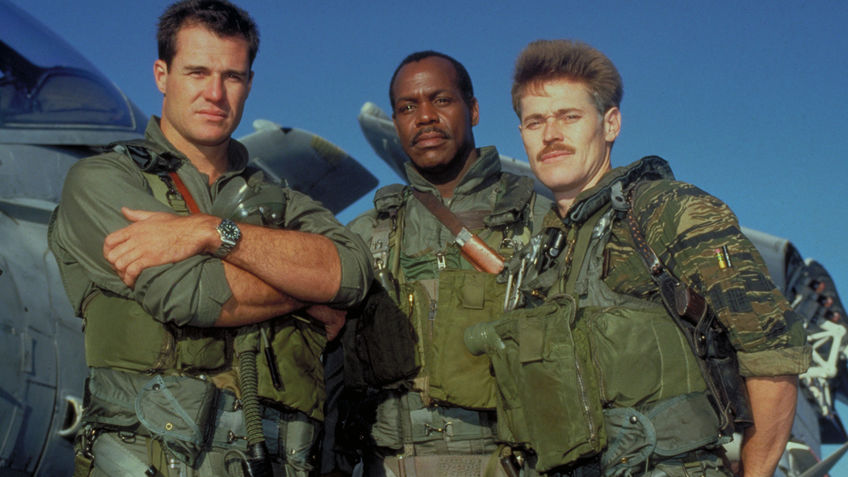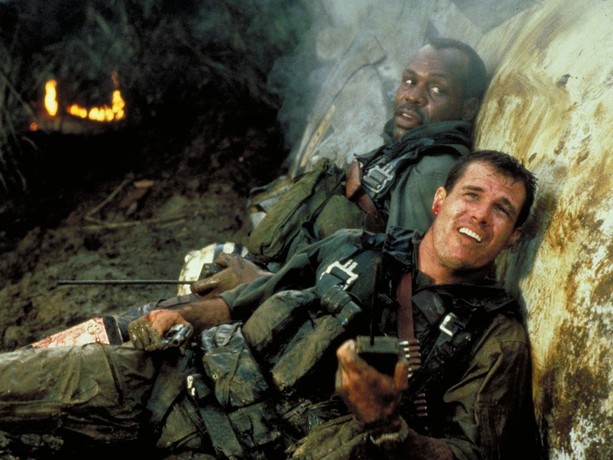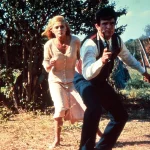Flight of the Intruder (1991)

“Flight of the Intruder,” directed by John Milius and released in 1991, is a war drama set during the Vietnam War that explores themes of honor, sacrifice, and the moral complexities of aerial combat. Based on the novel by Stephen Coonts, the film offers a gritty portrayal of Navy pilots navigating the perilous skies over Vietnam while grappling with the psychological and emotional toll of their missions.
The narrative centers around Lieutenant Jake Grafton (played by Brad Johnson), a U.S. Navy pilot disillusioned by the limitations imposed on his missions and frustrated by the escalating conflict. Alongside his bombardier/navigator, Lieutenant Morgan “Morg” McPherson (played by Willem Dafoe), Grafton becomes embroiled in a dangerous mission to defy orders and launch an unauthorized strike against a heavily defended target in Hanoi. Their goal is to avenge the death of a fellow pilot and challenge the constraints imposed by military bureaucracy.

At its core, “Flight of the Intruder” examines the personal and ethical dilemmas faced by military personnel during wartime. Grafton and McPherson’s journey is marked by moments of camaraderie, moral ambiguity, and profound loss as they navigate the complexities of loyalty to their fellow soldiers and their duty to uphold military protocol. The film’s narrative unfolds against the backdrop of a divisive war where patriotism and dissent collide, challenging viewers to confront the human cost of armed conflict and the sacrifices made in the name of duty.

Brad Johnson delivers a nuanced performance as Lieutenant Jake Grafton, portraying a character torn between his sense of honor and the harsh realities of war. Willem Dafoe brings depth to the role of Morg McPherson, capturing the camaraderie and moral resolve that drives their unauthorized mission. Their on-screen chemistry and shared sense of purpose anchor the film’s exploration of courage and sacrifice in the face of adversity.
Director John Milius infuses “Flight of the Intruder” with visceral aerial combat sequences and evocative cinematography that immerses viewers in the chaos and danger of aerial warfare. From intense dogfights against enemy MiGs to the haunting landscapes of Vietnam’s jungles and cities, each scene captures the brutality and unpredictability of combat, emphasizing the film’s portrayal of war as both a test of skill and a crucible of moral conscience.

Thematically, the film confronts the complexities of military ethics and the psychological toll of combat on its protagonists. As Grafton and McPherson confront enemy fire and internal conflict, they grapple with the consequences of their decisions and the price of their actions on themselves and their fellow soldiers. “Flight of the Intruder” challenges viewers to consider the moral implications of wartime decisions and the enduring impact of loss on those who serve.
The film’s visual and auditory elements contribute to its immersive storytelling, from the thundering roar of fighter jets to the haunting soundtrack composed by Basil Poledouris. Each sound and image enhances the film’s emotional resonance and underscores its exploration of heroism, sacrifice, and the bonds forged in the crucible of war.

“Flight of the Intruder” received mixed reviews upon its release but has since gained recognition for its realistic portrayal of aerial combat and its exploration of moral dilemmas faced by military personnel. Beyond its action-packed sequences, the film resonates with audiences for its portrayal of characters driven by honor and conviction in the face of overwhelming odds.
In conclusion, “Flight of the Intruder” is a compelling war drama that delves into the moral complexities and emotional challenges of aerial combat during the Vietnam War. Through its dynamic characters, gripping narrative, and visceral action sequences, John Milius crafts a cinematic experience that honors the courage and sacrifices of those who serve while probing the moral dilemmas and human costs of armed conflict. As viewers witness Grafton and McPherson’s harrowing journey, they are reminded of the enduring legacy of courage, sacrifice, and the profound impact of war on the human spirit.










